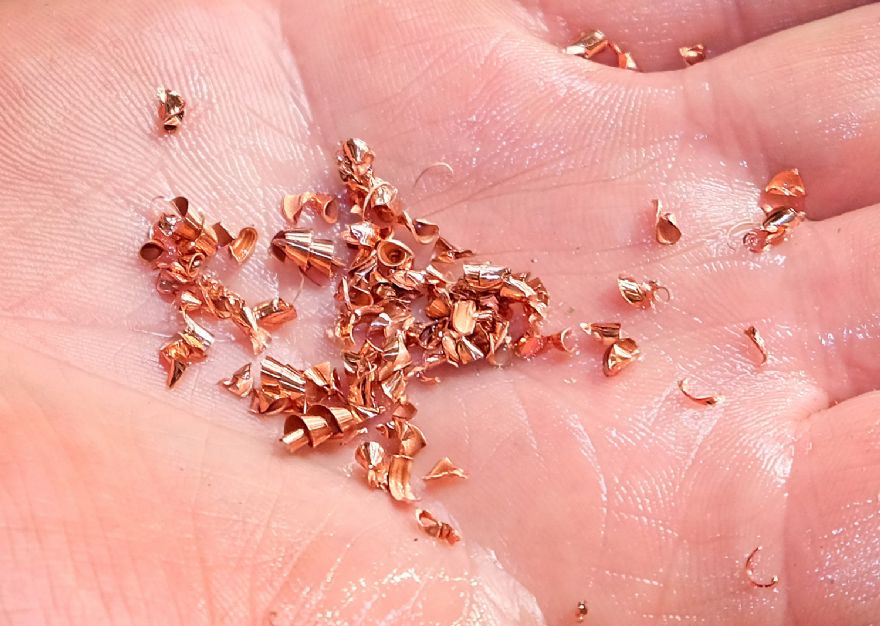 With LFV switched on, even sliding-head turning of copper bar results in short, manageable chips similar to those produced when machining brass
With LFV switched on, even sliding-head turning of copper bar results in short, manageable chips similar to those produced when machining brassAt
MACH 2024, which is taking place 15-19 April at the NEC, Birmingham (Hall 20, stand 361), Bushey-based
Citizen Machinery will reaffirm its position not only as the leading supplier of bar-fed lathes into the British and Irish markets, but also as a pioneer in implementing attendant technologies that take that pre-eminence to the next level in terms of innovative production. The company’s patented LFV (low frequency vibration) chip breaking software, its wealth of options for automating production, and integral laser cutting in its Cincom sliding-head lathes are three examples.
The focus will be on Citizen’s proprietary LFV operating system software that ensures efficient chip-breaking and every sliding-head mill-turn centre on the stand will have this functionality. 2024 marks the sixth anniversary of the technology’s launch.
It has had a transformative effect on sales of Cincom sliders around the world, and also on selected models within Citizen’s fixed-head Miyano turning centre range, owing to the superiority of chip breaking over that achievable with conventional pecking macros and dwells. That is especially the case when machining stainless steel, aluminium, copper, various exotic materials and plastics. There is also a noticeable improvement in tool life and surface finish due to the avoidance of re-cutting of chips.
Problems arising from stringy swarf entangling around the workpiece and tool are prevented by vibrating the X and Z servo axes in the direction of cutting in synchrony with rotation of the spindle. The function, which has three alternative modes, may be used with static and driven tools. It is especially helpful in generating manageable chip sizes when grooving, drilling deep, small-diameter holes, and internal and external thread cutting.
Automatic toolchangerA versatile variant has recently been added to the Cincom L20 sliding-head CNC turning centre range from Citizen Machinery UK. The L20-XII, which has a 135deg swivelling B-axis mounted on the gang toolpost for working at either of the opposed spindles, is now available with an automatic toolchanger (ATC) for swapping up to 30mm dia cutters in a chip-to-chip time of 4sec. Both the tool carrier and magazine move in the Y1-axis to effect tool change.
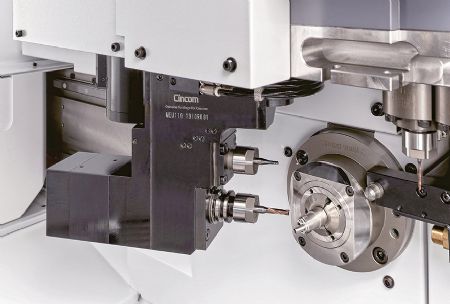 Pictured right: the B-axis tool carrier of the L20-XIIATC sliding-head lathe
Pictured right: the B-axis tool carrier of the L20-XIIATC sliding-head latheBelieved to be a first in a sliding-head turning machine, the ability to exchange 12 different cutters in the lower position of the B-axis carrier greatly extends the machine’s versatility when executing angled cross working or end-facing operations. A 13th tool is fixed in the upper position on the carrier. While the cutters are normally live for performing drilling, slitting, hobbing or multi-axis milling, positions may be filled by turning tools if expedient.
The total number of cutters that may be mounted in the working area of the Cincom L20-XIIATC is 34, providing considerable flexibility to ensure that components are machined in as few set-ups as possible, normally one. Tools are driven by a 2.2kW motor at up to 12,000rev/min, so even small diameter mills are capable of productive metal removal rates.
As its designation implies, the lathe is designed to turn components from 20mm diameter bar, although oversized options allow up to 25mm diameter material to be accepted. Another feature contributing to the lathe’s versatility is the ability to switch over quickly between sliding-head operation and non-guide bush turning for more economical production of shorter components up to typically 2.5D.
Three degrees of freedomVisitors to the Citizen Machinery UK stand will learn that the configuration of the 12mm bar capacity Cincom L12-X ideally suits it to the production of dental abutments and implants, as well as medical industry parts in general. Multiple rear-facing endworking tool positions including driven stations are provided, as well as a Y2-axis to the X2 and Z2 movements on the counter spindle to match the three degrees of freedom on the main spindle.
A modular tooling system has been adopted for the gang and back toolposts and an extensive variety of tooling layouts is possible, which includes the ability to drill angled holes. The maximum number of tools that can be deployed is 38. Unlike on other Cincom L12 models, a built-in 12,000rev/min motor drives the counter spindle, reducing acceleration/deceleration times for higher productivity. Rapid traverse in all axes of 35m/min contributes further to minimising idle times.
 Pictured left: working area of the M32-VIII, showing the turret and B-axis gang toolpost
Pictured left: working area of the M32-VIII, showing the turret and B-axis gang toolpostTwo Cincom lathes on the stand will have 32mm bar capacity, including the L32-VIII, which accepts 38mm stock if the guide bush is removed. It is one of four machines with exclusively gang toolposts in a modular range that allows a user to select a precise specification to suit the intended applications, while retaining the option of adding extra functionality later. The version on show will be a seven-axis model with up to 30 tools, said to have an excellent cost-performance ratio.
The other model is Citizen’s flagship sliding-headstock lathe, the 10-axis Cincom M32-VIII, now in its fifth design iteration. A 10-station turret, which runs on hardened box ways, incorporates a tooling system employing a single, heavy duty, 2.2kW drive to power the live cutters. The gang toolpost has been equipped with live tools powered by a 2.2kW motor, as well as a programmable, 9,000rpm B-axis to enable simultaneous machining in five CNC axes, while the back toolpost with Y-axis has adjustable-angle tooling. Three tools may be in cut at the same time, supported by the Mitsubishi M850W control with 15in touchscreen HMI control, shortening cycle times and raising productivity.
The lathe’s ecological credentials, as with other Citizen machines, are impeccable. The M32 is an environmentally friendly product that has undergone stringent assessment by the manufacturer. The use of easily recyclable materials and avoidance of hazardous substances are combined with Eco Function hybrid technology that automatically saves energy through the intelligent use of power during non-cutting periods.
One of the larger bar capacity CNC lathes in the Citizen Machinery product portfolio is the 12-axis Miyano ABX-64THY, a fixed-head model with twin-opposed C-axis spindles and three turrets moving over box ways for maximum rigidity. The turning centre is ideal for continuous, automated, unattended production of components from bar up to 64mm in diameter. Maximum component diameter when chucking is 165mm. Rapid traverse rates are fast at up to 30m/min in Z, promoting short non-cutting times.
High levels of productivityThe three turrets, which have 80mm of Y-axis movement, can all be in cut simultaneously to achieve very high levels of productivity. Two turrets are positioned above the spindle centreline and are dedicated to working at the 15kW/2,750rev/min main spindle and 7.5kW 5,000rev/min counter spindle respectively. The other turret is located below and has unrestricted travel to operate at either spindle to provide flexibility for balancing front and reverse-end machining operations, or to deploy a tailstock centre to support shaft-type components being machined in either spindle.
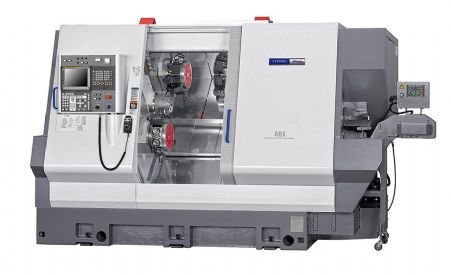 Pictured right: the 12-axis Miyano ABX-64THY, a fixed-head model with twin-opposed C-axis spindles and three turrets moving over box ways for maximum rigidity
Pictured right: the 12-axis Miyano ABX-64THY, a fixed-head model with twin-opposed C-axis spindles and three turrets moving over box ways for maximum rigidityTemperature variations around the machine are constantly measured by sensors and fed back to the Fanuc series 30i-B control, which incorporates software to compensate for thermal movement by adjusting the relevant axis positions. In this way, displacement of the turret from the main spindle in the X-axis, for example, is reduced from 30 down to 10µm. An in-machine tool setter, parts catcher and conveyor, and a variety of different swarf conveyors to suit the type of chip are all available.
The first fixed-head lathe in Citizen Machinery’s Miyano range to have the company’s patented LFV chip breaking software in a Fanuc control system was the 42mm bar capacity ANX-42SYY. It features 10 CNC axes including a ±35mm Y-axis on both the upper and lower turrets in addition to X- and Z-axis movements, enabling the production of complex components to tight geometrical tolerances.
The compact mill-turn centre is ideal for OEMs and sub-contractors keen to leverage the quality and productivity of a Miyano lathe and at the same time standardise on Fanuc controls on their shopfloor for the sake of operator familiarity and compatibility with other machines. The 15in XGA (extended graphics array) touchscreen Fanuc 31i control features a new Citizen HMI and incorporates the company’s multi-axis technology.
The 6.2-tonne machine occupies only 2,650 x 1,630mm of space on a shopfloor. Both main and sub-spindle have a bar capacity of 42mm dia and are powered by 11kW 6,000rev/min built-in motors. The turrets have 12 live tool stations each rated at 2.2kW 6,000rev/min 20Nm. Rapid traverse rates are fast at up to 30m/min, again with high productivity in mind. This has been achieved by adopting linear guides in all axes. Commonality of tool holders with Citizen’s popular BNA range of Miyano lathes leads to cost savings for existing users of the supplier’s equipment.
Complex components up to 65mm in diameter may be turned and milled from bar in a new Miyano fixed-head lathe. The 8-tonne BNE-65MYY is equipped with two turrets having Y-axis travel in addition to X- and Z-axis movements. One turret is positioned above and the other below the centreline of the twin-opposed spindles and both tool carriers have 12 live stations. A C-axis on each spindle and movement of the sub-spindle in X and Z bring the bar auto’s CNC axis tally to 10.
The two-axis movement of the sub-spindle facilitates superimposed machining, whereby tooling on both faces of the top turret can simultaneously cut front-end features on the bar stock and reverse-end features on a parted-off component. With the lower turret also working at the main spindle performing pinch turning, milling or drilling, for example, or perhaps OD turning while axial drilling is in progress above, three tools are in cut at the same time.
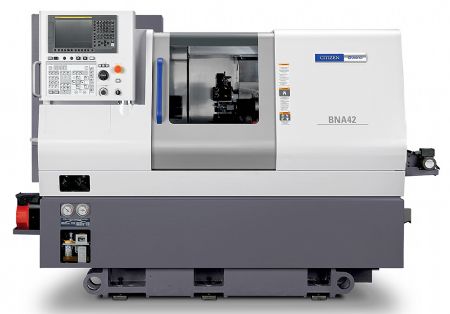 Pictured left: the Miyano BNA-42SY fixed-head mill-turn centre, which is prepared for automation
Pictured left: the Miyano BNA-42SY fixed-head mill-turn centre, which is prepared for automationContributing to high productivity are fast rapid traverses up to 20m/min, plus main and sub spindles with generous power ratings of 18.5kW and 11kW respectively. As both spindles rotate at up to 5,000rev/min, productive turning is maintained even when machining smaller diameter sections of a workpiece. Rotary tool specification is also impressive at 4kW 6,000rev/min.
Control is by the Mitsubishi M830W, which has a 15in touch-screen HMI control for convenient operation, including on-screen selection of the turret tooling. Intelligence built into the control simplifies programming, especially of superimposed cycles by automatically synchronising those sections of the program.
Building on the strengths of previous generations of Miyano fixed-head mill-turn centres, the BNA-42SY is one of Citizen Machinery’s latest additions to the range. The CNC lathe is the first BNA model to have a 12-station turret giving ±35mm of Y-axis movement, all tool positions now being live, and a new design that lends itself to easy automation. The latest Fanuc 0i-TF Plus CNC system with 10.4in colour LCD screen controls the machine.
AutomationThe rigid, 1,823kg bed brings thermal control advantages. The base casting has been prepared with space at the right hand side for robotic load/unload equipment. If a user intends to take advantage of automation, the machine can be supplied with a swarf conveyor that exits to the rear as an option.
The automation may be employed solely for unloading components that have been mill-turned from bar stock up to 42mm dia, either directly from a spindle or via a parts catcher and conveyor. Alternatively, or in addition, it may load and unload billets or near net-shape workpieces like castings or forgings up to 135mm in dia. A workpiece stocker is positioned at the right-hand side of the machine to accommodate the finished components.
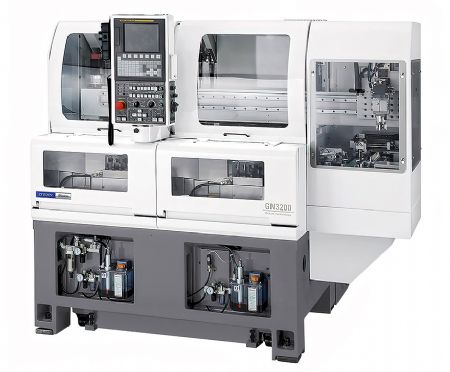 Pictured right: the GN3200W twin-spindle, fixed-head Miyano lathe
Pictured right: the GN3200W twin-spindle, fixed-head Miyano latheMounting points have been included to provide an option to add an overhead gantry if only chucking is to be carried out, in which case a raw material stocker can be positioned to the left of the machine in place of the bar magazine. For complete flexibility in layout, top shutter and automatic door options are offered.
Use of an inverter-controlled, hydraulic unit results in a large reduction in power drawn. Standby power consumption is just 0.661kW, as servomotor readiness is automatically turned off when it is not needed, for example during program editing. Overall energy consumption can be visualised via a power monitor window on the control screen.
The GN3200W is a twin-spindle, fixed-head lathe equipped with a high-speed loader for high productivity. The compact machine width is 33% narrower than previous Miyano models and the required floor space has been reduced by 27%, realising significant space saving. A wide choice of infeed/outfeed devices, single or double high-speed gantry loaders, transfer and turnover units makes the machine an ideal choice to meet automation needs.
The concept when designing the machine was to prevent thermal displacement by transferring the heat generated by machining into the machine body. This is achieved by having a frame and bed with a thermally symmetrical design, backed up by a wing-type headstock and a separate coolant tank.